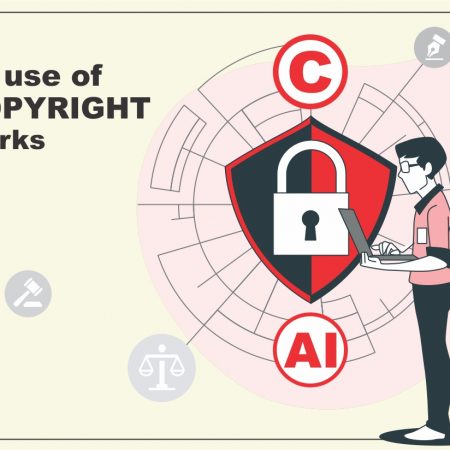INFRINGEMENT AND PASSING OFF OF TRADEMARK
Trademark is a sign, word or a combination of words, letters and numerals, drawings, symbols, sound, fragrance, colour , shape or packaging of goods which are capable of distinguishing goods of one proprietor from those of another. Registration of trademarks confers exclusive right to use the registered trademark by the owner, or licensing of the same to a third party for use in return of a payment. In India trademark registration is usually granted for a period of ten years after which it can be renewed by filing application with a requisite fee. Trademark Infringement is the unauthorized use of the trademark in connection with any service or goods. Registration of trademark confers the right on the owner to sue for infringement of the trademark. This right is an essential facet of the protection of trademarks. Regardless of the registration, another trader may still pass off his goods under your name and brand. This is known as passing off. At Knowledgentia Consultants, which is one of the best trademark and brand registration firm in India, we provide all services relating to trademark filing, registration and enforcement to all our clients not just within India but globally as well.
INFRINGEMENT AND PASSING OFF OF TRADEMARKS
| S. No. | Infringement | Passing off | |
| 1. | Type of remedy | The statutory remedy under Section 29(1) of the trade mark act, 1999 | Common-law remedy |
| 2. | Registration | It is a pre-requisite | It is not required |
| 3. | Proof | Plaintiff is only required to show deceptive similarity, as there is a presumption of confusion | Apart from proving deceptive similarity, the plaintiff is also required to prove confusion in public and the likelihood of injury to the plaintiff’s goodwill |
| 4. | Jurisdiction | The registered proprietor or registered user of the trade mark can institute the suit where they actually and voluntarily reside or carries his business or personally work for gain | Section 20 of the civil procedure code, 1908 would apply |
REMEDY FOR INFRINGEMENT AND PASSING OFF OF TRADEMARK
There are two types of remedies available in case of infringement/passing off of trademark. Plaintiff has the option to initiate proceeding under any one or both of them.
- Civil remedies,
- Criminal remedies
CIVIL REMEDIES
Indian courts have time and again provided remedies in the form of interim as well as permanent injunctions along with punitive and compensatory damages in trademark infringement and passing off cases. In case the court is convinced that both the marks have acquired rights due to long usage in a certain market, they can even pass orders to curtail the geographical scope. This means that you would be entitled to use the trademark in a certain territory and so will the respondent. This is to protect the rights vested in a trademark, even though it may be unregistered. The court would rely on where your primary customers, dealers, contractors reside and identify a suitable geographical limit for operation of the trademark.
UNDER THE TRADE MARKS ACT, FOLLOWING REMEDIES HAVE ALSO BEEN PROVIDED :-
- Suit for infringement/passing off can be instituted under Section 134 for infringement/passing off arising out of the use by the defendant of any trademark which is identical with or deceptively similar to the plaintiff’s trademark, whether registered or unregistered shall be instituted in district court having jurisdiction to try the suit.
- Relief under Section 135: – under Section 135(1) in a suit for infringement/passing off if the court agree (on the request of plaintiff), can grant either:
- Damages or
- An account of profits,
- An order for delivery-up of infringing labels and marks for destruction or erasure.
Together with or without any order for the delivery-up of the infringing labels and marks for destruction or erasure.
Under Section 135(2) court can give ex parte or interlocutory injunction order in accordance with Section 36-42 of specific relief act, 1963 or order xxxix rules 1 & 2 and Section 151 (inherent power of the court) of the code of civil procedure, 1908, for discovery of documents, preserving of infringing goods, documents or restraining the defendant from disposing assets which cause adversely affects the plaintiff.
CRIMINAL REMEDIES
- Any person who uses a particular trademark without permission of the proprietor and makes that trademark deceptively similar shall be deemed to falsify a trade mark under Section 102 of trade mark act, 1999. Penalty for the same is given under Section 103 of the same act.
- Penalty under Section 103: – any person falsifies any trademark or falsely applies to goods or services any trade mark shall be punishable with imprisonment for a term which shall not be less than 6 months but which may extend to 3 years and with fine which shall not be less than rs50,000 but which may extend to rs2,00,000.
- According to Section 104 if any person who helped the accused by selling, providing or hiring services of the such good, possessing such goods for sale or any other possible way will be punished with imprisonment for a term which shall not be less than 6 months but which may extend to 6 years and with fine which shall not be less than rs 50,000 but which may extend to rs 2,00,000.
Except in the case where that person can prove that
- He had taken all necessary precautions at the time of alleged offence.
- He gave all the information in his power, to the prosecutor with respect to the person from whom he obtained such goods or things or services.
- He had acted innocently
- Under Section 105 if a person commits any of the offence provided in Section 103 or 104 he shall be punishable for the second and for every subsequent offence, with imprisonment for a term which shall not be less than 1 year but which may extend to 3 years and with fine which shall not be less than rs 1,00,000 but which may extend to rs 2,00,000. Fines and imprisonment can be reduced if court thinks it fit.
This Section does not have retrospective effect
- Under Section 111 of the act forfeiture of goods is provided in the conviction or acquittal under Section 103 if there is no intent to defraud the plaintiff, the court convicting or acquitting him may direct the forfeiture to government of all goods and things by means of, or in relation to, which the offence has been committed.
- Section 115(3) make offence under Section 103 cognizable and under sub-Section 4 of Section 115, any police officer not below the rank of dsp and equivalent may, if he is satisfied that any of the offences referred to in sub-Section (3) of Section 115 has been, is being, or is likely to be, committed, search and seize without warrant the goods or things involved in committing the offence, wherever found, and all the articles so seized shall, be produced before a judicial magistrate of the first class or equivalent. Provided that the police officer, before making any search and seizure, shall obtain the opinion of the registrar on facts involved in the offence relating to trademark and shall abide by the opinion so obtained.
CASE LAWS
- CADBURY INDIA LIMITED AND ORS. V. NEERAJ FOOD PRODUCTS, [142 (2007) DLT 724],
In this case, the Delhi High Court explained the difference between passing off action and an action for trade mark infringement as under:
- An action for trade mark infringement is a statutory remedy and on the other hand, an action for passing off is a common law remedy.
- The use of the trade mark of the plaintiff, by the defendant, is also a prerequisite in the case of an action for infringement while it is not a necessity of an action for passing off.
- In an action for infringement of the plaintiff’s trade mark, it is immaterial that the outfit, outer covering and other written marks on the goods originate from a different source than that of a registered proprietor’s trade mark. The liability of the defendant in such a case may be absolute. However, in case of passing off of trade mark, the defendant may escape liability if he can show that the material added by him is sufficient to distinguish his goods from that of the plaintiff’s goods.
- In an action for infringement, the plaintiff on account of it being a registered trade mark in dispute claims to have an exclusive right to use the mark concerning those goods. However, a passing off by a person of his goods as those of another, in essence, is an action of deceit.
- SYED MOHIDEEN V. P. SULOCHANABAI, (2016) 2SCC 683.
The Apex Court stated that passing off right is a wider remedy than that of infringement. This is because the passing off doctrine operates on the general principle that no person is entitled to represent his or her business as the business of another person. The said action of deceit is maintainable for diverse reasons other than that of registered rights which are allocated rights under the act.
Knowledgentia Consultants has earned a name as one of the best trademark and brand registration firm in India as well as most client focused firm providing solutions for online trademark and brand registration matters locally as well as globally. We are your one-stop solution for all kinds of legal, compliance and supplemental matters concerning trademarks. In case of any query regarding this matter you may email us at info@knowledgentia.com or visit our website –https://knowledgentia.com/.








